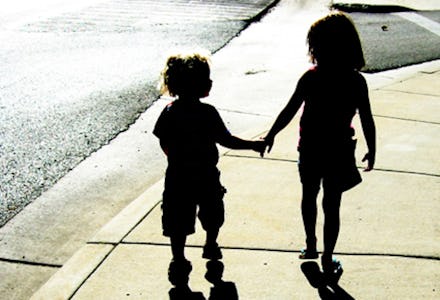The Truth About Having a Sibling With a Mental Illness

Viral videos, personal essays and other campaigns have received widespread attention in recent years for the experience of living with mental illness. But one group intimately affected by mental illness has largely gone unrecognized: the siblings of those living with these conditions.
Dubbed "well sibling syndrome" by some, studies and experts agree that individuals who have siblings with mental health issues have unique experiences shaped by this relationship. Here are just a few things everyone should know about what they face, according to the experts.
They may feel neglected
"As hard as parents may try — and they do — to meet the needs of their well siblings, time and energy are simply finite," Diane Marsh, a psychologist and co-author of a book on the topic, titled Troubled Journey, told NPR in 2007. "And so siblings often feel like the forgotten family members. Everybody else's problems are more important than theirs."
Clinical psychologist Stacey Rosenfeld confirms this. "Time, attention, and resources are often compromised as the family responds to the symptoms of the illness and seeks out treatment and support," she told Mic. "Particularly if the illness begins in childhood, the sibling won't necessarily have a clear understanding of why his/her parents become less available and able to meet his/her needs."
They experience their own psychological and emotional challenges.
According to a 46-year study conducted by the American Psychological Association published in 2008, people who have a sibling with mental illness are more likely to experience depression at some point in their lives than those who do not.
"A number of mental illnesses are genetic, so if one sibling is affected, others are more prone than the general population to developing similar (or related) concerns," Rosenfeld told Mic. "The stress of having a sick family member can also trigger health concerns."
Additionally, witnessing their sibling's own struggle can be a challenging emotional experience for many. Siblings may experience a version of survivor's guilt, Rosenfeld told Mic, and feel "guilty that they aren't afflicted," while their sibling was.
Therapy and professional help aren't only beneficial for individuals with mental health issues, but for their siblings too.
"Siblings must make their own health a priority," Rosenfeld said. "Support and therapy can be helpful in processing some of these difficult emotions."
They're not immune to mental health-related stigma.
Beyond feeling that their siblings are "misunderstood and not treated well by society," these individuals may feel socially isolated themselves, clinical psychologist Sheela Raja told Mic. They may even experience "vicarious stigmatization," or "the stigma of other people judging them in terms of their sibling having a mental illness," and "feel that their siblings are misunderstood and not treated well by society," she added.
This is just one reason greater social understanding of and support for individuals with mental illness is crucial. "We need more education so people understand this isn't a family failure, and to think of it with the same compassion that we do physical illness," Raja said.
Caring for a mentally ill sibling can take a toll.
"Like the airplane oxygen-mask analogy, someone can't properly care for an ill brother/sister if she isn't caring for herself," Rosenfeld said. "Siblings can be part of someone's support team, but shouldn't be the only members of the team. Professionals must be involved. Siblings can strike a balance between being involved but not sacrificing their own lives."
Siblings of people with mental illnesses commonly feel an "increased sense of responsibility in terms of taking care of their sibling — both as a child and then as an adult," Raja said. "In fact, some adult siblings feel that they should assume care-taking responsibilities as their parents get older."
But while they might feel obligated to or truly want to do so, being the sole caretaker for a mentally ill sibling may be detrimental for that person.
Raja advised siblings to accept that "sometimes they may not have control over the course of their sibling's illness, and nobody is to blame. It is very difficult for siblings to take care of their own adult responsibilities as well as an adult sibling, so programs that can support mental illness treatment and help families are key."
Nonetheless, while having a sibling with a mental illness is certainly a challenging experience, it can also be an empowering one. As Raja told Mic, "Many siblings find that they have tremendous strength and compassion that they never knew that they had."
Hopefully, as more attention is paid to these individuals' experiences, our society will only bolster that strength and compassion.